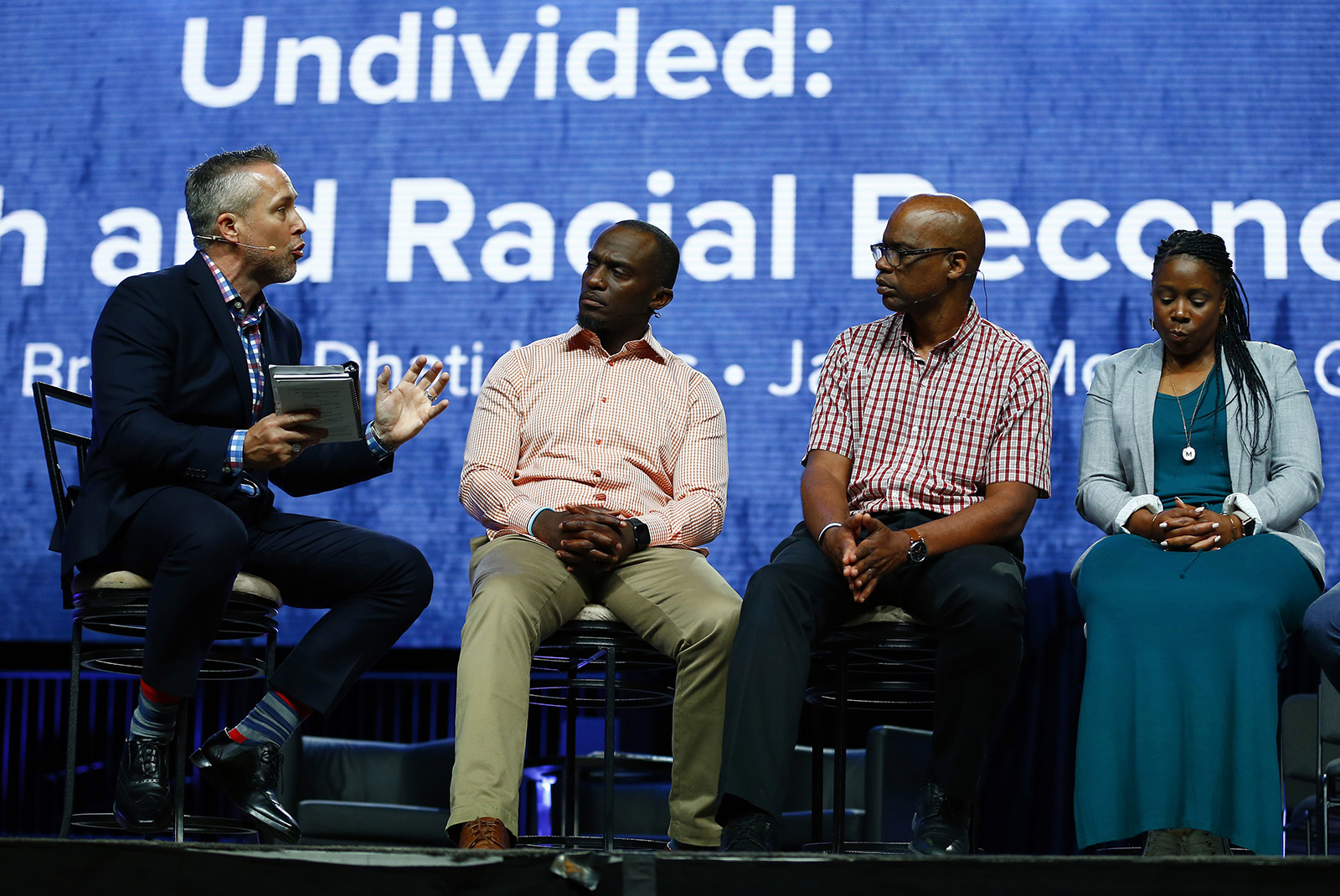 Photo Credit: “The Art of Social Media” (CC BY 2.0) by mkhmarketing
Photo Credit: “The Art of Social Media” (CC BY 2.0) by mkhmarketing
My mom was an excellent communicator. She wrote emails like they were letters. Long and newsy, full of the details of her day, and her specific encouragements on the trials of life. Of course, this came out of her only daughter and family taking off to live overseas. With three of Mom’s grandchildren! I will never forget how she bought her first and only computer to be able to communicate regularly with us. She died before the advent of smart phones and social media. Believe me: she would have figured those out as well – to communicate with those she loved.
Dave works in a setting which requires much of his communication to be electronic. He talks about how it has been world-changing in terms of being able to have real-time communication with colleagues. Even time zones away. Email, conference calls, and a myriad of smart phone applications make work practices easier. Especially that of inclusion and having the right people at the decision-making table.
The challenge is when electronic communication is almost but not quite communication. A quick texting conversation or series of emails do not substitute for a face-to-face meeting where nuance and clarification are more easily secured.
I have a friend and one-time colleague who calls me regularly on her way to or from work. Those conversations are so rich. We haven’t lived in the same city for 25 years, but I know her…her take on things, her challenges, and the wealth of her wisdom for my own stuff. We text occasionally, but she has excellent command of the phone-conversation-catch-up-with-friends skill.
The article linked below came to my attention this week. It got me thinking on this topic more. We want to be good at friendship, “family-ing”, working well with our colleagues, right? At least we don’t want to do harm with relationships as we focus on others at the moment. This article is so packed with good stuff, I’m leaving it right here for you to read yourself:
How to Be a Better Friend in the Digital Age by Amy Maclin and Molly Simms
In thinking about our relationships and communication in the digital age, here are my notes to self:
1) Stay in the present. – When in the company of friends or family, or in a work meeting, put electronic devices away if at all possible. In your purse or pocket or another room. Cell phones always with us (at meeting or dinner tables) smack of self-importance, really. I struggle here, so preaching to self. Remember the days when we wrote the things we wanted to remember on pads of paper or a napkin? Maybe you’re not distractible but once I pull out my phone to make a note or take a picture of the food, say, it becomes an uninvited guest at the table…drawing my attention away. Photo Credit: Pexels
Photo Credit: Pexels
You may not have this problem of distractability. We can always make an electronic record later of what we wrote down. We cannot reconstruct conversation we missed while fiddling with our phones. Nor can we recoup that sense of full attention for those in front of us, lost while we were on our phones or tablets.
2) Be proactive in communication. – This may be a challenge for most of us. I am grateful for updates from bosses who want their employees in the loop. Also, how wonderful to get birthday and anniversary cards in the mail (?!)…from proactive loved ones.
Letting friends and family know news, plans, and other details (of special interest between you) sooner than later sends a message. They matter to you, and their time matters as well. If these same people don’t hear from you, in time, they will come after you…better to be proactive, loving in this way.
3) Be quick and appropriate in responding. – [Outside of situation #1] Take the call when possible instead of letting it go to voicemail. Text back even a quick response, with a more complete communication to follow. [Because of their disruptive nature, some texts seem now to be treated as emails to be answered later and in a clump. I get that. Unless the texts become emails that also go unanswered. Just saying.]
Consider the best way to respond. A text may require an email response to be effective. An email may require a phone call in followup. If positive communication is the goal, we go after the medium that best suits.
4) Our social media presence communicates different things to different people. We all know this intuitively. Something to think about if we’re using it for work or to maintain contact with friends/family. Social media, in general, is not a personal vehicle for communication. Definitely broadcasting. Unless you engineer it to be personal. I get how some have elected to go more private, more narrowcasting (see link below). We must remember with this medium: we think because we’ve communicated to some, we have communicated to all. A caution if we care.
Networking: Broadcast or Narrowcast? – Genna Rodriguez
5) Avoid the fallout of negative or neglectful communication. – It always seems to have a greater impact than we intended. Or, should I say, a worse outcome. The “unfollow” or “blocking” or social media rant can be not only hurtful but relationship-altering. Not answering phone calls, texts, or emails will eventually stop those from happening…at a cost. Whenever a crucial or hard conversation needs to happen, a face-to-face meetup is best. Even if, because of geographic distance, it has to be via an electronic device (Facetime, etc).
We Have to Talk: A Step-by-Step Checklist for Difficult Conversations – Judy Ringer
Also related to social media: we often fall to being more consumers rather than creators. Our communication gets more passive, even lazy (it happens to me, for sure)…if we don’t take steps to practice being proactive in communication.
Having electronic communication – even at its impersonal worst – is better than no communication…but maybe not forever.
___________________________________________________________________________
Did I miss something? Please comment below.
In closing, I just want to give a salute to those in our lives who get all this. My friend who calls, a boss who doesn’t forget to followup, a family member who regularly checks in, that one who uses texts in a fun and familiar ways to touch base, and the people in our lives who practice kind and intelligent reason on social media posts.
I have a younger brother who has a non-stop work day. Long hours, leaving for work before I even wake up, and therefore getting to bed much earlier in the evening than most. We haven’t always been super close, but in these years of getting older and losing loved ones, we are now the next two oldest in our family. We are also much closer friends now than before…part of that is his initiation of calling on his long drive home from work. With hands-free technology to keep driving safe, it has become a sweet occasion between us.
Lastly, social media itself has been more a blessing to me than a curse. I have learned much from folks I follow on Twitter and Facebook. Through Facebook of all things, some once-close college friends and I were able to reconnect. What a gift!
So with all its challenges, the digital age has brought us more good than bad. If we are willing, we can hopefully keep it that way.
P.S. Communication at any level is colored by culture. My husband and I had the privilege of chauffeuring some Egyptian friends to their wedding reception. Our car was decked out in fresh flowers and streamers. Driving through the crazy Cairo night, Dave’s job was to get our friends safely to their destination, but that wasn’t all. Leading a small and festive parade, we were to let it be known to all those on the streets and in apartments above the streets, that a bride and groom were coming through. Traditionally, the driver periodically is to toot his horn in a rhythmic manner signaling those around us of an oncoming wedding party. DA-DA-dadada, DA-DA-dadada. That was the signal.  Photo Credit: The Cairo Scene
Photo Credit: The Cairo Scene
Everyone knew it and what it meant. Dave was an excellent Cairo driver, BUT he was timid in doing this small duty of horn-blowing. He would only do the first “phrase” of the announcement and not the obligatory second one. It was so not right. After a couple of times of my failed cajoling, he did it one more time with just the first horn toot phrase. A huge packed Cairo city bus passed by us, and its driver finished the phrase! I LOVED IT! We all did. Dave got the idea finally and we joyfully trumpeted to all those around us from that point on with just the right and understood alert!
Ah, true communication!






 Photo Credit:
Photo Credit: 












 Photo Credit:
Photo Credit: 






 Photo Credit:
Photo Credit: 


 Photo Credit:
Photo Credit: 





